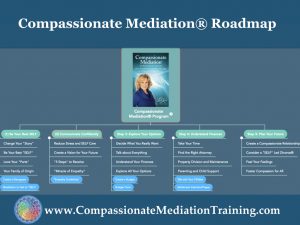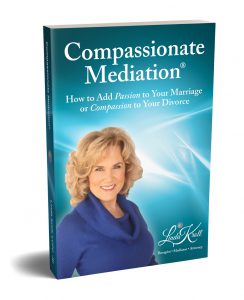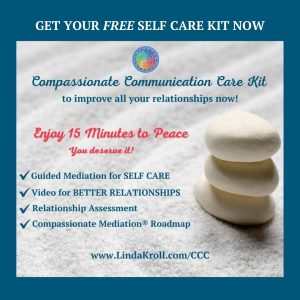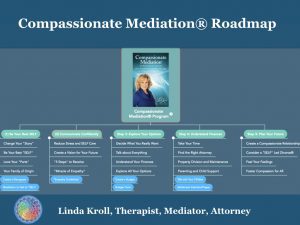“Should I stay or should I go?” is a question that I asked myself for over 30 years.
I married my college sweetheart. We had a wonderful time at the University of Wisconsin and married in 1969, so that ages myself.
Our first year felt like a frat house, so I thought, “Should I stay or should I go?”
But I was married to my dream man. We ended up having two dream children, and a dream home, and the dog and the life, and 20 years into the marriage, I was still asking, “Should I stay or should I go?”
I went to therapy. I talked to lawyers. I talked to everybody that would listen to me. I talked to my Rabbi. I prayed. I meditated.
I was an attorney by trade, but I didn’t really know what to do with that. I went back and became a mediator, because I thought if it was going to lead to a divorce, I would be able to mediate the divorce, which is very akin to deliver your own baby. It may be possible, but don’t do it, because you have no one advocating for you.
So, as a lifelong recovering codependent, I hung in there.
We separated after 20 years, and we were separated for 10 years before we got divorced.
And all along the way, I was looking for somebody that could meet me where I was, somebody who could help with the emotional piece that I was feeling, but give me some guidance that wasn’t, “Come back to marriage counseling,” where my husband wasn’t invested and I wasn’t sure I was invested. When I went to an attorney, and they had all the horror shows that they were going to portray from me, I wasn’t ready for that.
There was a part of me that thought I was keeping my family together, because even though we were separated, living elsewhere, and even dating other people, we were still married, and my children were still part of what I considered to be an “intact family.”
However, I was doing more harm than good.
When we finally got divorced, because I hadn’t finished the process I’m going to teach you today, later we had a post-divorce problem, and we were in court with the attorneys, with the typical adversarial process, and I remember when I was in the courthouse — I don’t know if you’ve been in the courthouse yourself — but it was almost like I was watching the walking dead, the walking wounded, the walking dead. The people that were walking up and down those hallways were traumatized.
They were in crisis. They were being led by their attorneys. They had no idea how to communicate, and I was one of them.
I sat in the courtroom with my soon-to-be beloved ex-husband on one end, and I was on the other end, and I told myself… And our attorneys were back in the other room, because I was an attorney, but the judge didn’t want to hear from me. So the attorneys were talking about our future, and we were glaring on opposite sides of the courtroom.
I told myself there had to be a better way to do this.
I was already an attorney. I became an attorney after I graduated. I didn’t practice. I was able to stay home with my children, which is great. I wasn’t really an attorney by nature. I’m not a fighter. So when I became a mediator, that was a little better, but it still didn’t do it.
Then I met Dick Schwartz.
Okay, I met Dick Schwartz. He took me on the “Self up the mountain.” Did he ever do that one with you? So when he took me and my SELF up the mountain, and I recognized all the parts of me that wanted to stay, wanted to go, hated him, loved him, scared, terrified, hopeful, excited ,,,,,I knew I was home.
I’ve probably counseled thousands of men and women, either individually or together, and for over 30 years.
I’ve also offered it online, which has helped people online in the program.
It’s a process that I want to hand you, and today, I want you to take as much as you can, leave what you don’t.
I think we all have the same mission, really.
You know, I’m going to show you the what, but it’s really more about the why today. Why would we do it?
I mean, we do it because we’re not just helping people make decisions. We’re helping them heal, and this is a process that helps them heal and either create a new relationship from the, “Should I stay or should I go?” or to create a peaceful and respectful separation and divorce.
Join Linda Kroll, Therapist, Mediator, Attorney, and author of Compassionate Mediation®: How to Add Passion to Your Marriage or Compassion to Your Divorce, and Compassionate Divorce™: Changing the Face of Divorce, One Heart at a Time — as she shares with you her transformational process of conflict resolution.
Get Linda’s FREE Compassionate Mediation Roadmap and free training to help your clients add passion to their marriage or compassion to their divorce. You can increase your impact, expertise and income with the skills you will receive.www.CompassionateMediationTraining.com
 .
.
Join the Compassionate Communication Community on Facebook and stay connected with Linda.
You can send your questions to her in the group and get them answered in Facebook Lives!


